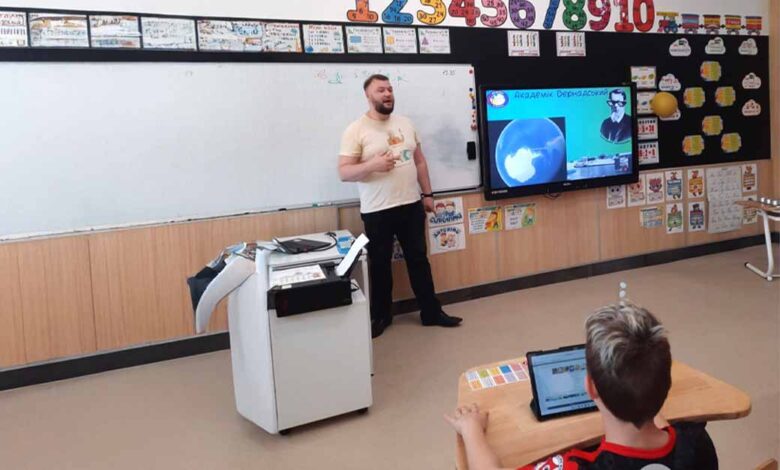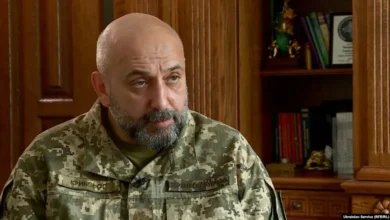The teacher spoke about the disappointing signal from NMT-2025, animators and the problem of public schools

In Ukraine, there is a public debate about the state of school education, the role of the teacher, the difference between public and private schools, educational losses and the place of creativity in the educational process. At the center of this conversation are not only system documents or draft laws, but above all the living voices of teachers who work with students every day. A post by teacher Andriy Utkin about a state educational institution in which the administration forbade him to hold informal meetings with children after classes: playing board games, singing songs, treating them with goodies recently attracted the attention of many educators and parents of schoolchildren on social networks. According to the teacher, this was one of the reasons for his dismissal.
Now Andriy teaches geography in one of the private schools in Kyiv, conducts classes for children at the “School of Superheroes” on the basis of “Okhmatdyt” and even conducts online lessons from Antarctica. He shared thoughts on “animation” among teachers, differences between public and private schools, the importance of TikTok in modern education.
Andriy Utkin notes that the decision to leave the public school was not emotional or instantaneous – it matured gradually. He faced a number of limitations that made it difficult for the children to develop, and for him as a teacher. It is not only about administrative rules, but also about the general lack of flexibility: when it is difficult to change the format of the lesson, introduce modern approaches or offer non-standard solutions without unnecessary approvals. He adds that the issue of remuneration also remains relevant. According to the teacher, it is objectively low, especially if the teacher wants to be not just an executor according to the schedule, but a specialist who develops, invests in children outside of class, participates in activities and works with inspiration. And when you’re also a parent, the financial burden only grows.
In addition, Andrii Utkin believes that the difference in the approach to children in public and private schools is significant. In a private school, a student is a partner who is listened to. In the public school, he is often only an executor, because individual teachers rather than the system as a whole make the student a full-fledged partner. He notes that in a private school there is more flexibility, modern methods, an atmosphere of trust and freedom for the teacher. They are not afraid of experiments there, and the teacher’s initiative is a plus, not a problem.
At the same time, Utkin emphasizes that he does not divide schools into “bad” and “good”. There are public institutions that work better than some private ones. It all depends on leadership, team and values. If the teacher is given freedom, if the student is perceived as an individual, if there is faith in a live lesson – children will learn with pleasure. In public schools, it is necessary to change not only the textbooks, but the very logic of interaction: less fear, more trust.
Andriy Utkin also believes that educational losses are a reality that cannot be ignored. However, he considers leaving a child for the second year as an extreme measure, which should be applied not en masse, but individually and very well-founded. Otherwise, there is a risk of further demotivating those students who have already lost touch with learning. Both parents and teachers often consciously or subconsciously compare today’s schoolchildren with themselves in childhood. But he calls such a comparison incorrect, since many of today’s children are experiencing a completely different childhood: the COVID-19 pandemic, full-scale war, distance learning, anxieties, loss of stability. Some students, especially from the younger grades, still haven’t been to school for a single day. We have no moral right to judge these children by the same criteria as ourselves in 2005.
The teacher supports: individual educational routes, additional consultations, work with motivation. He is convinced that if the approach is not changed, there is a risk of finally losing those children who already feel confused and removed from the school process. Today, they do not need pressure, but understanding, faith and access to resources.
Andriy Utkin admits that the workload on teachers is really huge – both in private and public schools. However, the main difference is whether the teacher has a sense of meaning and support. In a system where the teacher is only a reporting tool, burnout is inevitable. Where there is trust, autonomy and the opportunity to create, even a large volume of work is perceived differently. He admits that he also gets tired, but what saves him is that he does his work consciously and with inspiration. He is motivated by the children and the grateful feedback he receives after the events. The teacher recalls that when he conducted integrated lessons with other disciplines at his school, when he taught in “Okhmatdyt”, when he controlled games with students or prepared a project lesson with Antarctica – it was not an obligation, but a sincere desire.
Utkin emphasizes that this is his way not to fade away, to preserve the meaning and feeling of contact with children. He also focuses on such teachers as Artur Proydakov, Ruslan Tsygankov, Vitaly Dribnytsia (the author of the YouTube channel on the history of Vox Veritatis), calling them “beacons” that illuminate the creative path of both young and experienced teachers. For them, as well as for himself, the main source of energy is children, because it is they who provide the impetus for which teachers stay in the profession.
Andriy Utkin emphasizes that he regularly talks about the importance of geography on social networks – and under his posts there are often confirmations that many teachers, parents and even students consider this subject to be undervalued. Geography was chosen by very few entrants, and mostly they were motivated children who knew why this subject was for them and prepared purposefully – on their own or with tutors. But such students are rare, the rest simply do not consider geography as something serious.
He believes that this is not a problem of students, but a problem of the Ukrainian education system in general. Geography is often perceived as a background subject, “for a tick”. Now it is on the verge of extinction. It is reduced to the names of capital cities and contour maps, instead of teaching spatial logic, critical thinking, and understanding of global processes. He emphasizes that the high percentage of those who passed the NMT is not an indicator of success in the subject, but rather a signal: almost no one chooses geography. And until the attitude towards it is changed, neither the program nor the results will become truly representative.
The teacher emphasizes that when choosing subjects for NMT, students are guided not by their interests, but by what is needed for admission. Unfortunately, geography is rarely required – most popular specialties do not require it as a competitive subject. Therefore, even those who are sincerely interested in geography are forced to choose other disciplines in order to have a better chance of admission. It’s not the child’s fault, it’s the system’s problem: geography gets sidelined again and again. As for the test itself, he respects his colleagues who compiled the NMT, in particular Ruslan Tsygankov, and he himself does not rule out such a possibility in the future.
Utkin agrees that in the current environment, passing the exam is a real challenge. After anxious nights, without light, in shelters, it is extremely difficult to concentrate and demonstrate maximum knowledge. The exam should remain serious, but at the same time be fair, adapted to the realities and aimed at testing understanding, not stress resistance. At the same time, he notes that, like most teachers, he works according to the NUS program and generally supports its philosophy. This is really a step forward: activity approach, intersubjectivity, development of critical thinking.
However, as a practicing teacher, he also sees systemic problems. The program is sometimes overloaded, the topics are presented fragmentarily, and the educational materials do not always correspond to the declared approaches. He believes that one of the main problems is the lack of synchronization between subjects. When different teachers talk about similar things at different times, with different terminology, without agreement, the student does not see the whole picture. His knowledge falls apart into separate fragments, instead of being built into a logical system.
This can only be solved through cooperation – both at the level of teachers in the school and at the level of subject teams that create curricula. He does not claim absolute truth, but he is convinced: as long as each object exists in its own informational “vacuum”, the child will get lost between them. And intersubjectivity will remain a slogan, not a reality.
Recently, there have been a lot of accusations against creative teachers, that they are like animators, because they entertain children, shoot Tik-Toks and try to show as much as possible on social networks. Andriy Utkin says that he himself discusses this topic in social networks and even conducted a survey among teachers, parents and schoolchildren. Most believe that the teacher’s presence in social networks is not a problem. It all depends on what goal a person pursues and what he broadcasts to the outside. Children like it when they have common interests with the teacher, when the teacher is not only a “talking head”, but a living person. They appreciate when the teacher can joke, accept, understand.
Utkin notes that in today’s world, a teacher who enters the classroom with a morally outdated textbook and begins with the phrase “open paragraph #…” enters a competition that he has already lost even before it began. Since children live in a dynamic visual environment, he believes that if we want to reach them, we should use formats they are familiar with: streams, tiktoks, interactives.
At the same time, Utkin emphasizes: the form should never come before the content. If there is no depth, preparation, mastery of the material – no picture will help. The social network is a tool. If the teacher conducts it for himself or for his loved ones, it is normal. But if he works publicly as an educational blogger, he bears another responsibility: he must be aware of what he says and how it affects the audience. As for “animation”, he suggests that brilliant teachers 30, 50 and even 100 years ago were also partly animators – it’s just that such a concept did not exist yet. Unfortunately, today the word “animator” is often devalued, equating it with a clown.
But he believes that a teacher who has theatricality, emotion, and live energy is not a clown, but a charismatic specialist. He is convinced that children do not care whether you are a “young specialist” or “the leading methodologist of the universe”, but they will definitely remember how you supported them, surprised them or made them laugh. The point, in his opinion, is not what you give, but how. And if the teacher knows how to convey the content beautifully and inspiringly, he is a real teacher.
He recalls that there was and still is skepticism among former colleagues – they continue to keep in touch, and he values this relationship. Some people think that streams with students, games, memes, links to comics or influencers are not serious. But he explains: it’s just a different format. Not a game for the sake of playing, but a game as a tool. A lesson as a performance, as a dialogue, as a shared adventure is not entertainment, but a way of engaging and thinking. And if the child after the lesson starts asking “why?”, then for him it is already a victory.





